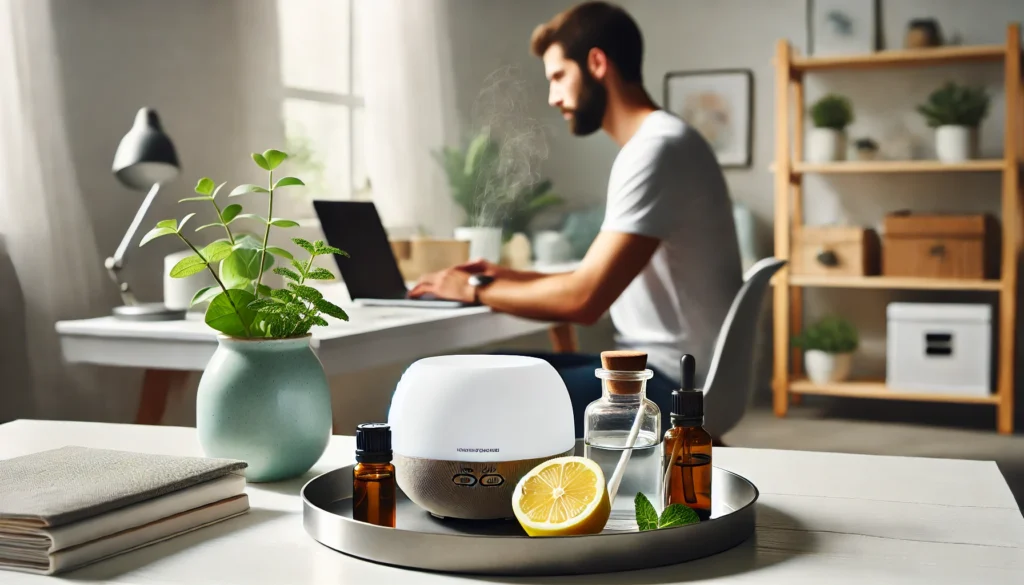Exploring Synergistic Blends for Cognitive Performance
Energizing essential oils for focus and concentration are most powerful when used in synergistic blends that amplify their cognitive benefits. These thoughtfully crafted combinations of multiple oils work together to enhance each other’s therapeutic effects, producing a more profound impact than any single oil alone. By selecting oils that stimulate both the nervous and circulatory systems, these blends can support mental clarity, sustained alertness, and overall cognitive vitality. For example, a blend of rosemary, peppermint, and lemon—three well-known energizing essential oils for focus and concentration—can significantly boost memory, sharpen attention, and promote emotional balance, making them an ideal addition to any daily productivity routine.
Creating personalized blends allows individuals to address specific cognitive needs throughout the day. Morning blends may favor citrus-forward oils to invigorate and awaken the mind, while midday blends can incorporate basil or black pepper to sustain mental energy. Evening formulations may include lighter notes of eucalyptus or ginger combined with calming oils like lavender to enhance clarity without overstimulation. This customization makes aromatherapy deeply personal and adaptable, offering a tailored experience for various lifestyles and neurological demands.
These blends can be used in multiple formats, including diffusers, roll-ons, bath soaks, and room sprays. Each method of delivery affects the body differently. Inhalation remains the fastest and most direct route to the brain, making it ideal for quick boosts in focus. Topical applications, when properly diluted, may provide longer-lasting effects and a gentle aromatic experience throughout the day. Incorporating essential oils for concentration into these daily practices allows individuals to take a proactive approach to mental well-being that is both enjoyable and sustainable.
You may also like: How to Improve Focus and Concentration: Proven Techniques for Boosting Mental Clarity and Productivity
Aromatherapy and Neuroplasticity: The Science of Habit and Scent
The brain’s capacity to change, known as neuroplasticity, is an exciting frontier in neuroscience and cognitive health. Emerging research suggests that consistent behavioral routines—especially those paired with sensory stimuli—can reinforce neural pathways that enhance learning, memory, and resilience. The use of essential oils for focus and energy during consistent activities such as studying, meditating, or working can form strong scent associations with productivity and alertness, eventually triggering these states with scent alone.
This conditioned response is not unlike the effect of listening to the same music while studying or working out. Over time, the brain associates the specific stimuli with a mental state, creating a shortcut to enter that mode quickly and efficiently. Aromatherapy oils for concentration, when used deliberately during moments of deep focus or cognitive exertion, can become powerful tools for accessing flow states and building productive habits.
Furthermore, this process of scent conditioning supports habit formation, which is central to long-term cognitive enhancement. By embedding essential oil use into daily rituals, individuals create predictable and reinforcing cues for mental focus, energy, and emotional stability. This not only supports acute cognitive performance but also strengthens the brain’s ability to self-regulate and adapt to new demands over time, contributing to both resilience and longevity.

Empowering Cognitive Wellness Through Sensory Mindfulness
Sensory mindfulness is the practice of engaging the senses fully in the present moment to cultivate awareness and cognitive clarity. When paired with the use of energetic essential oils, this practice can enhance both the psychological and physiological aspects of focus. Aromatherapy becomes a vehicle through which individuals can deepen their connection to their cognitive and emotional states, fostering a holistic sense of awareness.
For instance, taking a moment to pause, inhale the scent of a stimulating oil like spearmint or lemon, and consciously redirect attention to the task at hand can reset scattered thoughts and reduce mental fatigue. This micro-practice becomes particularly powerful when repeated regularly throughout the day, transforming routine moments into mindful rituals. These rituals reinforce mental discipline and self-awareness, both of which are key components of cognitive endurance.
The integration of sensory mindfulness with energizing aromatherapy oils allows for the cultivation of mental presence in environments often characterized by distraction and sensory overload. Rather than relying solely on external tools or technologies for focus, individuals reclaim agency over their cognitive landscape. The combination of sensory mindfulness and essential oil use presents an accessible, natural approach to nurturing sustained focus and mental stamina.
Looking Ahead: Innovations and Future Research in Aromatherapy for Brain Health
The field of aromatherapy is expanding rapidly, propelled by growing consumer interest and increasing scientific validation. Future research is expected to explore more deeply the biochemical pathways through which essential oils exert their cognitive and neuroprotective effects. Sophisticated imaging techniques such as fMRI and EEG are already being used to measure the brain’s response to scent stimuli in real time, offering exciting insights into how aromatic compounds interact with specific brain regions.
In addition to traditional single-oil studies, future investigations may focus on complex blends and their cumulative effects on cognitive health. This will allow researchers to better understand how combinations of essential oils for energy and focus affect not just individual brain functions but the broader systems involved in attention, memory, and emotional regulation. Furthermore, advancements in biotechnology may lead to the development of more precise delivery systems, such as nanocarriers or wearable scent devices, that enhance bioavailability and user experience.
As the science matures, we can expect to see aromatherapy become more integrated into clinical and therapeutic settings, particularly in areas like elder care, mental health, and neurorehabilitation. This integration will require continued adherence to EEAT principles, ensuring that claims are supported by evidence and that safety remains paramount. The future of energizing aromatherapy oils is not just promising—it is deeply relevant to the future of brain health, offering a natural complement to the growing arsenal of tools for cognitive longevity.

Frequently Asked Questions: Essential Oils for Focus, Energy, and Cognitive Health
What are some uncommon but effective ways to use essential oils for energy and focus during long workdays?
In addition to standard diffusion or topical application, layering aromatherapy into your workspace design can be surprisingly effective. Try scent zoning, where specific energizing essential oils are applied to items like wrist supports, chair cushions, or fabric wall panels to create a subtle, long-lasting aroma in your environment. This ambient presence of essential oils for energy and focus helps sustain alertness without overwhelming your senses. Another emerging technique is pairing aromatherapy with biofeedback apps—by syncing oil application with heart rate variability tracking, users can better understand when to apply stimulating blends for optimal cognitive output. Using energetic essential oils in combination with sound therapy or binaural beats can also enhance both attentional stamina and mood regulation.
Can essential oils be used to support ADHD symptoms or executive dysfunction in adults?
While essential oils are not a substitute for medical treatment, some individuals with ADHD or executive function challenges report improvements in task persistence and emotional regulation when using essential oils for attention and focus. Oils such as vetiver, cedarwood, and spearmint may help reduce mental restlessness while supporting alertness. Integrating aromatherapy oils for concentration into routines—especially alongside tools like timers, to-do lists, or habit trackers—can create stronger environmental cues for focus. Some people also use essential oils as part of a sensory modulation toolkit, helping to manage overwhelm in fast-paced work or learning environments. Clinical research is ongoing, but anecdotal and preliminary evidence suggests that aromatherapy oils for focus may complement behavioral strategies effectively.
Are there gender-specific preferences or responses to energizing aromatherapy oils?
Though scent perception is subjective, emerging studies suggest men and women may respond differently to various aromatic compounds. For instance, women often report heightened olfactory sensitivity and emotional resonance with floral-based oils, while men tend to favor woodsy or citrus-forward blends when selecting energizing aromatherapy oils. These preferences can influence the effectiveness of essential oils for concentration, as emotional congruence with a scent enhances cognitive engagement. Customizing blends based on personal scent affinity may boost not only attentiveness but also motivation. Gendered scent profiles, when chosen with intention, allow for more personalized and therefore more effective use of essential oils for energy.
How do essential oils compare to nootropics or smart drugs in enhancing mental performance?
Unlike synthetic nootropics that often modulate neurotransmitter levels directly, essential oils work primarily through the limbic system and olfactory pathways to influence mood, alertness, and cognitive perception. While the effects of essential oils for focus and energy may be subtler and less immediate, they offer a safer, side-effect-free alternative or complement to pharmaceutical interventions. Many users appreciate the gentle, cumulative benefits of essential oils for attention and focus, especially when used consistently. Additionally, essential oils for energy and focus can enhance other nootropic strategies by creating a multisensory environment conducive to productivity. Their low risk of dependency and versatility makes them ideal for long-term integration into wellness routines.
What role do cultural traditions play in how energizing essential oils are used around the world?
Different cultures have long-standing relationships with plant-based aromatics, many of which align with modern concepts of cognitive enhancement. In Ayurvedic medicine, for example, oils like tulsi and sandalwood have been traditionally used to clear the mind and support spiritual clarity. In Traditional Chinese Medicine, oils from herbs like ginseng and ginger are used to balance Qi and restore mental alertness. These cultural practices often integrate essential oils for energy in ways that emphasize harmony and holistic balance, rather than isolated stimulation. Drawing inspiration from these traditions can help users approach energizing essential oils not just as productivity tools but as part of a broader cognitive and emotional wellness philosophy.
Is there a difference between using essential oils during the day versus at night for cognitive health?
Absolutely, and understanding this temporal context is key to maximizing the impact of essential oils for focus and attention. During the day, stimulating oils such as rosemary, lemon, or eucalyptus can enhance alertness and support energy-driven tasks. At night, however, using gentler aromatic transitions with calming oils like lavender or chamomile—possibly paired with small amounts of uplifting scents—can promote cognitive processing and memory consolidation without disrupting rest. This circadian-aware approach helps the brain shift naturally between focused activation and restorative integration. Applying essential oils for energy in the morning and switching to aromatherapy oils for concentration and calm in the evening can foster mental balance and long-term cognitive sustainability.
Can essential oils support mental performance in high-stress or crisis environments?
In high-stress scenarios, the body’s fight-or-flight response can impair executive function and short-term memory. Certain essential oils for focus and energy—particularly those with grounding or adaptogenic properties—may help regulate cortisol and support composure. For example, frankincense, bergamot, and basil can be used in combination to sustain alertness while maintaining emotional equilibrium. These energetic essential oils can act as psychological anchors, especially for professionals like first responders, healthcare workers, or educators under sustained pressure. Portable delivery systems such as inhaler sticks or wearable diffusers enable discreet use in demanding environments without disruption.
Are there any overlooked essential oils that offer powerful cognitive benefits?
Yes, several lesser-known oils deserve more attention in the cognitive wellness space. For example, bay laurel is known for its subtle stimulating effects and ability to support creative flow and verbal fluency—making it ideal for writers or speakers. Ravintsara, often overshadowed by eucalyptus, provides a clear-headed focus that combines respiratory clarity with mental elevation. Helichrysum, while primarily known for skin regeneration, also supports mental resilience and clarity during emotional transitions. Including these oils in your toolkit expands the repertoire of essential oils for concentration and creates new possibilities for customization. These emerging players in the field of energizing essential oils may offer unique advantages based on individual biochemistry and goals.
How can essential oils be integrated into group settings like classrooms or offices without overwhelming others?
Using essential oils for energy in shared spaces requires thoughtful application to respect individual sensitivities and preferences. One approach is using passive diffusion methods, such as aroma stones or reed diffusers, which release scent gradually without saturating the air. Rotating oil use and selecting universally appealing options like citrus or mint can help prevent olfactory fatigue. Offering personal aromatherapy inhalers also empowers individuals to access aromatherapy oils for focus without affecting others in the room. Additionally, workplaces and schools are increasingly incorporating scent wellness policies that allow for the therapeutic use of energizing aromatherapy oils while maintaining an inclusive environment.
What are the psychological implications of using essential oils for energy and focus over the long term?
Over time, consistent use of essential oils for concentration may help establish psychological anchors for productivity and calm. This conditioning process, similar to the Pavlovian response, can train the brain to associate specific scents with desired mental states—creating reliable emotional cues for focus or relaxation. These scent associations can enhance self-regulation skills, increase emotional intelligence, and reduce decision fatigue by embedding structure into otherwise chaotic routines. Moreover, the ritual of applying aromatherapy oils for concentration invites moments of mindfulness that may serve as protective buffers against burnout. When used intentionally and reflectively, essential oils for energy and focus become more than sensory tools—they evolve into companions in one’s journey toward greater cognitive mastery.

Conclusion: Harnessing the Power of Essential Oils for Lifelong Cognitive Clarity
Incorporating essential oils for energy, focus, and concentration into daily life is more than a passing wellness trend—it is a profound opportunity to enhance mental clarity, emotional resilience, and long-term brain health. From the immediate boost provided by aromatherapy oils for energy to the cumulative benefits of consistent use in supporting neuroplasticity and emotional regulation, these botanical extracts offer a scientifically grounded, holistic path to cognitive wellness.
As we navigate an increasingly demanding cognitive landscape, the use of energizing essential oils stands out as a gentle yet powerful ally. When selected thoughtfully and used safely, essential oils can transform ordinary moments into rituals of renewal and focus. Whether you’re seeking to power through a deadline, stay mentally sharp in later years, or simply enhance your daily sense of presence, these natural tools provide a bridge between sensory experience and sustained mental vitality.
The future of cognitive enhancement will likely be multifaceted—combining neuroscience, behavioral strategies, nutrition, and yes, aromatherapy. By embracing the role of essential oils for attention and focus, we not only reclaim control over our cognitive state in the present but also lay the foundation for a mentally vibrant and resilient future.
Further Reading:
Essential oils for focus and concentration
Essential Oils For Focus And Concentration: Clear Your Mind
What Is Aromatherapy? Benefits, Uses and Types of Essential Oils To Fight Fatigue


